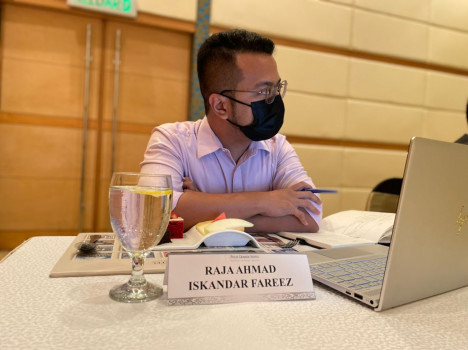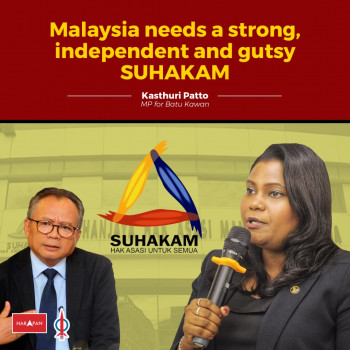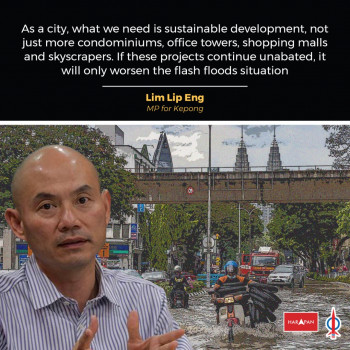In February this year, Prime Minister Najib Razak stated that the price of RON95 would be sustained in spite of the rise in global oil prices.
Come April, Ismail Sabri Yaakob, formerly minister of Domestic Trade, Cooperatives and Consumerism stated “Petrol is a major essential item and if the government increases the price, it will result in traders resorting to hiking their prices as well and this will burden the people,” said Ismail.
That month, Najib assured Malaysians that subsidies would continue under his administration as he was focused on controlling the rising cost of living. Then Barisan Nasional won the general elections in May. Four months later their promises have evaporated.
There are several problems with Barisan Nasional’s excuses for this week’s fuel price hike. These are typical for its ‘act first, deal with the problems later’ approach:
1. Shifting to more targeted assistance for the poor
If the motivation to help those who earn below RM3,000 is genuine, then why make them suffer higher prices for goods and fuel in the months between now and when Bantuan Rakyat 1Malaysia (BR1M) x.0 is implemented?
Going by past performance, there is typically a lead-in time of about one to three months between tabling a budget and the distribution of BR1M handouts. How will the poor deal in the interim?
Furthermore, BR1M handouts are occasional ad hoc affairs, whereas fuel consumption is an ongoing daily expenditure for the rakyat. BR1M is not a solution for those experiencing an uncomfortably high cost of living from increased fuel prices. We also should remember that many Malaysians are out of pocket following Hari Raya festivities.
If we take the generous assumption that ad hoc cash handouts are a sustainable remedy for chronically low incomes, the gentlest approach for the rakyat would be to only reduce the fuel subsidy after the cash handout is applied. But this would still leave people deprived until the next round of handouts is approved.
Deputy Finance Minister Ahmad Maslan admitted as much in July when he said that, “With the [projected] BR1M increase to RM1,200 [from RM500] this will help cover household expenses for two months. The people will need to find their own means for the remaining 10 months.”
Perennial dependency on cash handouts will not reduce the subsidy bill. Najib spent RM2.9 billion of public money on BR1M 2.0. With the promised increases the BR1M bill will increase to RM6.96 billion. This RM4 billion increase in BR1M will more than cancel out the estimated RM1.1 billion the government expects to save from rolling back fuel subsidies.
Thus, the net result of the BN’s actions will be to increase both inflation and the subsidy bill.
2. Middle-class will feel effects of inflation, too
BN already recognises something needs to be done to alleviate the inflationary impact for the middle-classes. This group has had to deal with fairly stagnant wages for over a decade. Housing and food prices have been rising in the last few years so the 10% increase in fuel price will be a squeeze on their absolute consumption. Despite the government’s warning to traders to not raise their prices by more than 1%, it is likely that an inflated cost will be passed through to consumers. Rather than increasing prices by 1 or 2 sen, traders may go for a tenfold increase in the order of 10 to 20 sen as they have done in the past.
3. Reducing subsidies may be a reasonable means to reduce the budget deficit, but should it be the first measure?
Wastage and corruption should be cut first and income-boosting policies should take effect before subsidies on essential goods should be open to reconsideration.
A good part of our budget deficits incurred over the last few years can be attributed to covert and overt election spending by Najib. BR1M and advertising spending by the Prime Minister’s department alone account for over 21% of our 2013 fiscal deficit of RM14.9 billion. Now that Najib has won his first elected term why should these expenditures be maintained?
Analysts who comment on the need for the government to improve its tax base generally avoid commenting on how well and how accountably the government spends its present tax income. It must be recognised that our deficit, and its attendant debt burden, are subsidising governmental corruption.
Just as we should not have a knee-jerk subsidy mentality, we must also avoid an approach of fiscal austerity that shortchanges the 38.5% of Malaysian households that earn below RM3,000 per month.
A better approach to promote would be to correct the principles and sequencing of fiscal reforms:
1. Standard of living of the rakyat should take priority;
2. Public spending should be cost-effective and development effective;
3. Give before you take away. Targeted subsidies should be implemented before a poorly performing universal subsidy is taken away.
An analogous example would be with public transport. Ideally, a public transport network should be functional, up and running before implementing a congestion charge or other disincentive for private car usage.
We are in need of policies that will increase Malaysian incomes rather than deplete them.
In countries with high median incomes a goods and services tax (GST) may be an efficient way to collect taxes. However, in countries with low median incomes such as Malaysia, implementing GST would be a regressive measure and unfairly burden the poor.
Tax revenue is ultimately a function of the overall dynamism of the national economy. The Malaysian government is still obliged to implement policies that will promote industrial expansion, productivity, rising incomes, fair wage bargaining, and equitable distribution.
If the rakyat feel the dividends of such policies any rollback in subsidies will hurt less. Yet, with the lack of economic innovation coming from the Najib Administration, the rakyat may have to wait until after the next elections for the tide that will float all boats.





Pingback: Fuel price hike wrong approach to fiscal reform | PR
There are many other areas where the government can reduce their spending instead of cutting the fuel subsidy to the rakyat. One such area is the defense subsidy. Do we really, really need a defense budget of RM23billion???? I read this somewhere. Is Malaysia going to be invaded over night. I know about Lahad Datu but the rebels is hardly a threat to a much bigger nation such as Malaysia. Why not make the defense budget RM20 billion and let the rakyat continue enjoy the fuel subsidy? It will also be a good idea to impose charges on foreign cars who are using our roads. The Hari Raya open house by the PM – RM2.9 million??? I think that is ridiculous. Again, unnecessary spending. I can go on quoting many examples.
Every time there is a fuel hike, food items and many other goods increase in price. However, when there is a drop in fuel price – I still remember that it went down from a high of RM2.70 per liter at one stage (to be corrected if I am wrong), the fuel price drop is not correspondingly reflected on food items and the other goods. What is the BN government done to manage this? I do not see any effective measures from BN. All that has surfaced are merely lip service. Eventually, who suffers the most? The rakyat. It would be good if one of the DAP reps can bring this up in Parliament.